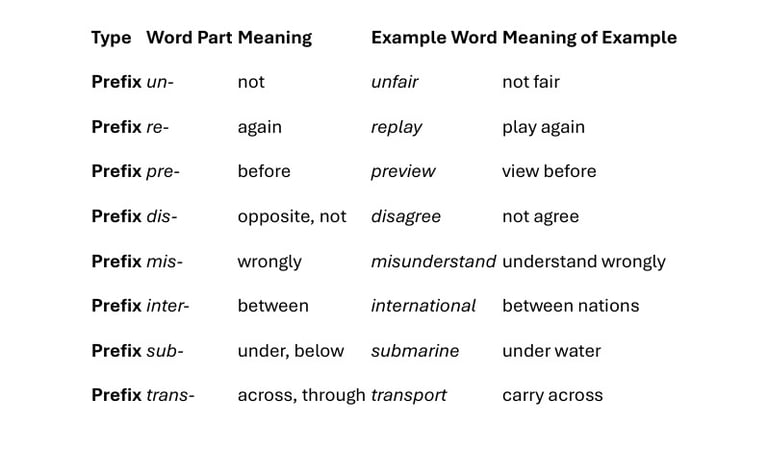Building Words, Building Understanding — The Power of Affixes and Roots
Language is like a puzzle made of parts, and each part holds a clue to meaning. In English, many words are built from roots, prefixes, and suffixes — and when you learn how these parts work together, you unlock a powerful skill: the ability to understand unfamiliar words, even if you’ve never seen them before.
This is the power of knowing affixes (prefixes and suffixes) and roots. A root is the base part of a word — its core meaning. Prefixes are added to the beginning, and suffixes to the end, each changing the word’s meaning or role in a sentence. For example:
The word unhappiness comes from the prefix un- (not), the root happy, and the suffix -ness (state or condition).
So unhappiness means the state of not being happy.
By recognizing these parts, you can guess the meanings of hundreds of words without a dictionary. Words like predict, transport, or rejection all become clearer once you understand what pre-, trans-, or -tion mean. This knowledge helps you:
✅ Build a larger vocabulary
✅ Improve reading comprehension
✅ Understand academic and technical terms
✅ Spell and pronounce words more easily
Whether you’re preparing for exams, reading English books, or just having conversations, knowing affixes and roots gives you a strong foundation in the language. It turns confusing words into understandable ones — and transforms you from a memorizer of vocabulary into a master of meaning.
In this lesson, we’ll explore the most useful roots, prefixes, and suffixes in English and how you can use them to decode new words with confidence.
Table: Common Prefixes, Suffixes, and Roots in English
| Suffix | -ful | full of | hopeful | full of hope |
| Suffix | -less | without | careless | without care |
| Suffix | -er / -or | person who does | teacher / actor | someone who teaches / acts |
| Suffix | -able / -ible| capable of being | readable / visible | can be read / can be seen |
| Suffix | -ness | state or condition | kindness | the state of being kind |
| Suffix | -ment | action or result | achievement | the result of achieving something |
| Suffix | -tion / -sion| act or process | creation / decision| the act of creating / deciding |
| Suffix | -ly | in a certain way (adverb) | quickly | in a quick way |
| Root | port | carry | transport, import | to carry across / bring in |
| Root | scrib / script | write | describe, script | to write down / a written text |
| Root | vid / vis | see | video, invisible | something seen / not able to be seen |
| Root | struct | build | construct, structure| to build / a built form or system |
| Root | dict | say, speak | predict, dictionary| say ahead of time / a book of word meanings |
| Root | form | shape | reform, uniform | shape again / one shape or style |
| Root | tele | far, distance | telephone, television| sound at a distance / viewing from afar |
| Root | geo | earth | geography, geology | study of the earth / study of rocks and land |
🎯 How to Use This Table
When you see a new word, try breaking it into parts:
Look at the prefix (beginning)
Look at the root (middle)
Look at the suffix (end)
un- = not
believe = root (to think something is true)
-able = can be
➡️ Unbelievable = something that cannot be believed
🧠 Mini Quiz: Understand the Meaning from Word Parts


